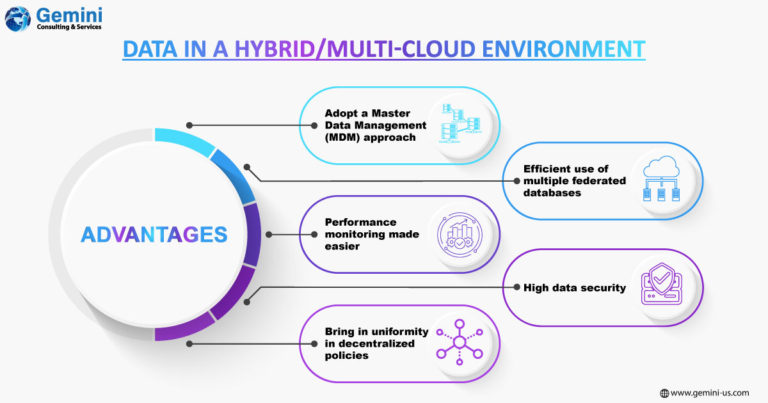Cloud technology is increasingly becoming popular among enterprises due to its flexibility and scalability. Organizations are busy making prudent strategies to gain maximum business value from their cloud investment. Moving workloads to a hybrid cloud that combines private cloud services and on-premise infrastructure is one of the most preferred choices for organizations.
The hybrid or multi-cloud approach helps benefit from the systems and data that have been built over time while providing greater control over data distribution options and storage. It is also ideal for enterprises that want to make sense of each component of their businesses. This option enables businesses to maintain existing platforms and integrate them with new capabilities.
According to Forbes, to build effective multi-cloud solutions, enterprises require data and a good business strategy.

Hybrid/Multi-Cloud Solutions
- Hybrid IT solutions deploy a private cloud, public cloud, and legacy in-house infrastructure to improve the overall cloud architecture. It connects all these components to create a unified environment and provides functional advantages such as application portability.
- Multi-cloud solutions on the other hand use two or more cloud service providers and may include multiple private clouds, multiple public clouds, or even in some cases multiple hybrid clouds. There may be multiple vendors and mostly is a mix of cloud service providers, such as AWS, Azure, or Google Cloud.
Finding the appropriate location for the right workload will provide huge organizational and operational benefits. An optimized target landing zone for a particular workload is a necessity. The solution does not just lie in hyper-scaling the cloud but in balancing hyper-scale, mid-scale, and private clouds. A Hybrid Multi-Cloud (HMC) strategy drives agility and brings about cost efficiency with innovation being the focus of all efforts. It utilizes various cloud computing services from multiple different cloud vendors, and private cloud deployment and distributes computing resources in a systematic and structured manner minimizing data losses. When more than one public cloud service combines private cloud resources, it is considered a multi-cloud.
Businesses must modernize applications on cloud or open systems without disrupting the existing critical work on legacy systems. Gemini Consulting & Services can help enterprises to unify and manage data from applications, databases, data warehouses, etc. that have been spread across the hybrid multi-cloud environment. Contact us to get the right guidance for data management in a hybrid multi-cloud environment.
Handling Data in a Hybrid/Multi-Cloud Environment
Since multi-cloud systems harness several cloud infrastructures with less delineation between private or public cloud environments and entirely different providers or vendors. With such a system in place, vendors like Google, Amazon, or Microsoft can all work in tandem to support the different computational needs of businesses.

- Businesses could adopt a Master Data Management (MDM) approach along with a toolset attached to the distributed database. This also needs to be attached to other federated databases (multiple databases functioning as a single entity).
- Efficient use of multiple federated databases, including the ones that abstract data from many distributed back-end databases is important. This helps extract logical business and analytical views of the data allowing a business to leverage data in multiple ways without having to change its structure.
- Performance monitoring is critical here as this approach is prone to network latency and dealing with differences in platforms. This particularly holds well when federated databases become unusable and accessed from a different cloud or platform.
- Data-level security right from the granular level of records to ensure data is protected at the record, grouping/table, or database levels. Compliance issues also need to be adhered to.
- Data redundancy issues need to be handled as inconsistent formats of data for different functions may not favor stakeholders in their quest for a single version of the truth.
- Data security is a priority in both database and the cloud. Businesses must provide a record or object-level security, and access can be allowed or disallowed based on who uses the database. Some databases depend on native security systems of the hosting cloud. This can pose a security challenge due to distributed data.
- The core objective of data governance on distributed data platforms is to ensure that decentralized policies govern data in a unified manner; enforcing compliance and encryption norms is therefore a must. Businesses must clearly make use of Personally Identified Information (PII) and tackle recovery operations when a database fails or becomes corrupted. Let us also remember that data governance can slow down database performance becomes an issue, especially in hybrid/ multi-cloud environment.
Strategies to Avoid Database Management Challenges
Now the three main challenges around data management in this environment are federation, security and compliance, and governance.
It is a bad idea to build databases by adding them as and when needed as it leads to federation and redundancy issues. Enterprises need to plan. When databases are set up for hybrid clouds, the focus should be on avoiding redundancy and complexity. Once these issues are security, governance, and performance issues become much easier to handle.
Ensure that the infrastructure is sound and correctly configured so that database performance is optimal at all times. Most of the time there is an underlying network or a poorly configured storage system in the cloud that can be a hurdle. The proper functioning of databases depends on cloud I/O systems. As a result, it is important to rectify any kind of misconfiguration immediately.



